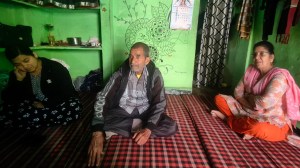Needle of doubt
Insulin or oral medication? Diabetics often fear the needle and convincing patients takes up much of doctors time
Most people in this country have faced a diabetes treatment debate insulin or oral hypoglycaemics either directly or for a relative or friend. This is not surprising at all because there are 62.4 million diabetics in India as per the phase I study by ICMR. There is no final word on which is better yet as doctors are grappling with various permutations of treatment,some personal preferences and emerging data on the most appropriate combination of drugs for optimum management of blood sugar.
Starting a patients treatment with insulin almost always proves to be a tall ask because of its association with the intractability of the disease. This perception is not correct,even though insulin is the second or third option to manage diabetes,behind a range of oral drugs which have various side effects.
Insulin is a hormone secreted by the beta cells of the islets of Langerhans of the pancreas. It is associated with key functions related to carbohydrate and fat metabolism of the body. Diabetes or poor blood sugar control is linked to deficiency in either the quantity type I diabetes or the potency type II diabetes of insulin secreted in the body. For type I diabetes,often referred to as juvenile onset diabetes,insulin is the only option. The insulin vs oral medication debate kicks in for type II diabetes,where the cells responsiveness to diabetes is reduced.
Patients in India are very reluctant to get started on insulin. That is the greatest barrier for doctors because they have to be talked into agreeing to the treatment module. The principal reason is the fear of the needle as most patients still associate insulin with the thick needle used for blood tests. They do not know that a very fine needle is used for administering insulin. The second aspect is the perception that insulin is the last resort in diabetes management. Depending on the timing of insulin use,it is possible for patients to get back to oral medicines or even go off them later if the beta cells are sufficiently revived, says Dr Anoop Misra,director and head,department of diabetes and metabolic diseases,Fortis Hospital.
Doctors are admittedly cautious about starting a patient on insulin,not because the hormone,unlike oral medicines can trigger weight gain or cause blood sugar to dip,but because getting patients started on it always involves a very lengthy process of counselling. In specialist practice,there is a counselling backup. Even then,only around half of my patients who need insulin agree to being administered the hormone. In general practice,it could be as less as 10 per cent, says Dr Ambrish Mithal,chairman and head of the department,division of endocrinology and diabetes,Medanta Medicity.
For a disease which dates back to 1,500 BC one of the symptoms of diabetes,frequent urination,is mentioned in an Egyptian manuscript of that time,prolific research is on across the world even now.
For treatment,there is one aggressive option of starting insulin immediately after a person is first diagnosed with diabetes. The rationale behind this is that in type II diabetes,the reduced action of the insulin on cells keeps blood sugar perpetually high,and in response to that cue the beta cells secrete copious amounts of the hormone. The over-secretion exhausts the cells so that after some time the secretion starts decreasing. Proponents of insulin as first line therapy say that it gives the beta cells a break to recover and if given early enough,they can start secretion again. If it has been too long,the cells may die so there is no chance of revival.
The second option is to give one drug at the start,continue to do so till stops being effective and then move on to another drug. Insulin is often looked at as the second or third option. This is the most popular module in India,while in the West a different kind of treatment is gaining momentum. This treatment says that there should be multiple drugs to target multiple sites in the body for better blood sugar management. However,insulin is effective in all stages of diabetes,unlike oral medicines which may not always work on elderly diabetics,and is the cornerstone of diabetes management during pregnancy,organ damage or an infection.
Many oral hypoglycaemics like metformins,sulphonylureas,etc. have a beneficial effect not just on blood sugar but also on the liver,on cholesterol levels and on fat metabolism,making them good options for Indians as the incidence of metabolic syndrome is very high in India,says Dr Misra. Now,there is a separate group of non-insulin injectible anti-diabetic drugs which bind to membrane receptors for glucagon to increase synthesis of insulin. Insulin and glucagon are both secreted from the pancreas and their actions are diametrically opposite of each other.
Apart from weight loss and low blood sugar,doctors are cautious about insulin treatment for a third reason. I recently got a call from a man in Jhumri Telaiya,Jharkhand,who said his mother was prescribed insulin,but cannot take it as they rarely had electricity and as a result,their refrigerator did not work. He said there was nobody to administer the hormone either. There are many practical considerations for insulin like whether the patient can monitor blood sugar,etc, says Dr Mithal.
- 01
- 02
- 03
- 04
- 05






























